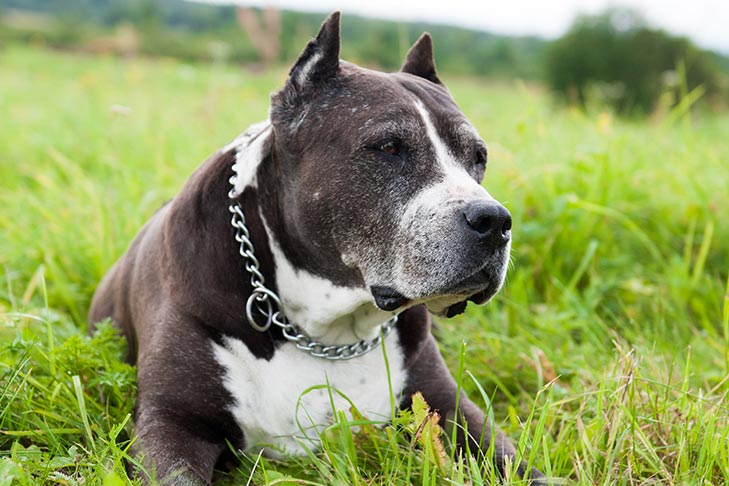One of the most common questions owners ask veterinarians about their senior dogs is “Can elderly dogs get Alzheimer’s?” You may have noticed that your older dog has started slowing down, or that she seems disoriented and anxious. Some of this is normal aging, but your dog could also have the canine equivalent of Alzheimer’s disease: Cognitive dysfunction syndrome (CDS)
Cognitive function, or a person’s memory, learning, perception, and awareness capabilities, is easy to measure in people, but a little harder to measure in dogs. We can’t exactly ask them to recite the alphabet or the day of the week, so veterinarians and owners rely on behavioral changes and symptoms to diagnose the condition.
Symptoms of Cognitive Dysfunction Syndrome in Dogs
Veterinarians use the acronym DISHAA to help them diagnose CDS:
- Disorientation
- Interaction with people and pets
- Sleep/wake cycles altered
- House soiling, learning, memory
- Activity altered
- Anxiety
Disorientation
Dogs with canine cognitive dysfunction often suffer from symptoms of disorientation. These can include wandering, apparent confusion, and things like going to the wrong side of a door to be let out. The dog may stare blankly at walls, floor, or into space; get stuck, or have difficulty getting around objects, and not recognize familiar people.
Social interaction changes
Canine dementia affects the way your dog interacts with you, as well as with his environment. Some dogs may appear needier, while others grow aloof and withdrawn. Dogs may have decreased interest or time spent in petting, spend more time alone or away from family members, or some can be more clingy and fearful.

Sleep-wake cycles
We all want to sleep through the night, and we want our dogs to sleep through the night, too. Dogs with Cognitive Dysfunction Syndrome often have difficulty sleeping and may wake during the middle of the night and pace, whine, or bark. Disruptions in sleep cycles are disorienting, and some dogs may even show agitation or fear. Some dogs may sleep noticeably more during the day.
House soiling, learning, and memory
One of the more frustrating symptoms of cognitive decline for owners is house soiling. Dogs that are housebroken often start to have accidents without any medical cause, which creates a mess for you and anxiety for your dog. Symptoms include a decrease or loss of signaling to go out, decreased response to learned commands (like name, tricks, etc.), and difficulty in getting your dog’s attention.
Activity changes
Canine cognitive dysfunction also affects your dog’s activity levels. Some dogs may grow more active with Cognitive Dysfunction Syndrome and others more sedentary, but any noticeable change in your dog’s activity level is a cause for concern.
Anxiety
Your dog may have increased anxiety when separated from you, he may be more reactive or fearful to auditory stimuli, or have a heightened fear of places and going outside.
Dogs with canine dementia may also suffer from a symptom often seen in human patients with Alzheimer’s: sundowning. In late afternoon or early evening, as sundown approaches, your elderly dog may experience a sudden onset of her symptoms, including increased anxiety, restlessness, increased confusion, surges of energy, mood swings, and sadness.

Diagnosing Cognitive Dysfunction Syndrome in dogs
There is no definitive test for diagnosing CDS. Veterinarians instead screen senior dogs for early signs of canine dementia when they come in for checkups. If they suspect that a dog has canine cognitive dysfunction, they ask the owner for a behavioral history to see the extent of the changes in the dog’s behavior.
Before your veterinarian can give you a definitive diagnosis, however, she also has to rule out any other causes. There are quite a few diseases and conditions that can cause similar signs to CDS, including:
- Endocrine diseases like diabetes, Cushing’s, and hypothyroidism
- Painful conditions like arthritis or skin disorders
- Metabolic disorders, like liver or kidney problems
- High blood pressure
- Medication side effects
- Loss of vision or hearing
- Urinary tract infection
Ruling out other conditions usually requires blood work and other diagnostic tests. These tests are worth it, as they will enable your veterinarian to diagnose your dog accurately.
Treating Canine Cognitive Dysfunction
There is no cure for, however, there are steps you can take to make your dog more comfortable. Veterinarians have a wide range of approaches to treating canine cognitive dysfunction, including medications, nutritional support, and behavior modifications.
Medications
There are several options in your veterinarian’s pharmaceutical arsenal to help alleviate the symptoms of CDS in dogs. Selegiline is a drug that was developed to treat pituitary-dependent hyperadrenocorticism (Cushing’s disease) and CDS, and can control many of the clinical signs of canine dementia. Antidepressants and anti-anxiety medications can also reduce anxiety in your senior dog, and sleep aids can help them get back on a normal sleep-wake cycle.
Nutritional Support
Diets supplemented with appropriate amounts of fatty acids and antioxidants have been shown to improve cognitive function in senior dogs, so talk to your veterinarian about the best diet for your senior dog, especially if the dog is showing signs of canine dementia.
Although nutritional support has long been considered an aid in reducing or controlling the effects of canine dementia, a recent study by researchers at the University of Veterinary Medicine, Vienna, and University of Liverpool, posits that diet may have no effect on symptoms of aging. Researchers used a new battery of tests, the Modified Vienna Canine Cognitive Battery (MVCCB), to analyze aging dogs’ decline in several factors. This is very new research, however, and more study is needed.

Behavior Modification
There are behavioral steps that owners can take to make their dogs more comfortable, as well. Just as we make exceptions and adjustments for aging human relatives, caring for a senior dog with canine cognitive dysfunction requires a little flexibility.
One of the best things you can do for your senior dog is to continue to provide mental stimulation. Even though he may no longer be able to run and jump, he still needs to be engaged. Play, light exercise, and training are just as important for your senior dog as they were for your puppy. Smell walks, which let your dog sniff to his heart’s content, may not involve much walking, but they do provide important scent stimulation. Puzzle toys and food toys can also give your dog something to think about, and keeping playtime and exercise structured gives dogs a routine and reduces anxiety.
Try to avoid changing your schedule. Anxious dogs thrive on a routine, and keeping your senior dog to a familiar routine in familiar environments can help alleviate anxiety and disorientation. Teaching a “settle” command may also help very anxious dogs.
As much as we love our senior dogs, nobody enjoys cleaning up after pet accidents. Dogs with Cognitive Dysfunction Syndrome are more likely to have accidents in the house. Instead of feeling frustrated, make arrangements for your pet to relieve himself easily. This could mean installing a dog door or creating designated indoor potty areas for your dog.
Living With Cognitive Dysfunction Syndrome
Dogs with canine dementia can lead full and happy lives, as long as you know what your treatment options are. If you suspect that your senior dog may have CDS, call your veterinarian and set up an appointment to see what you can do to make your dog more comfortable in her golden years.

